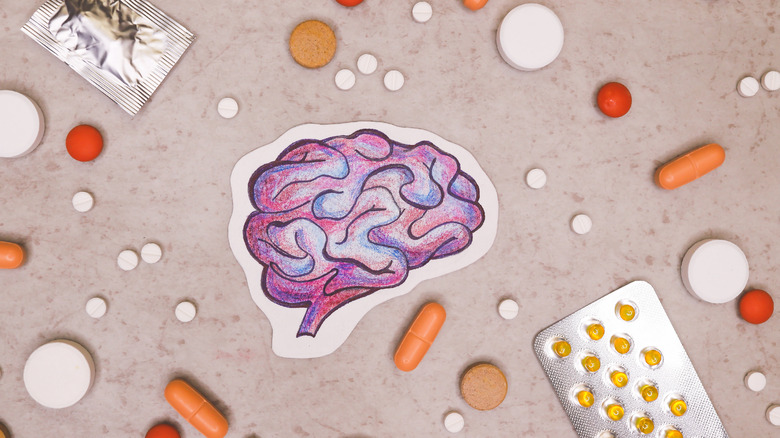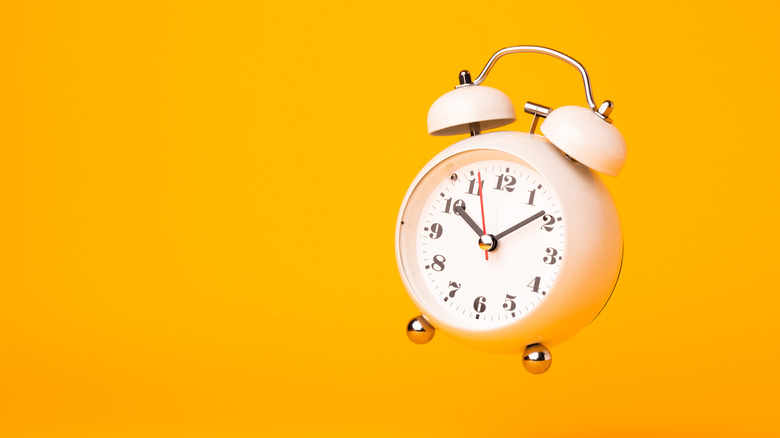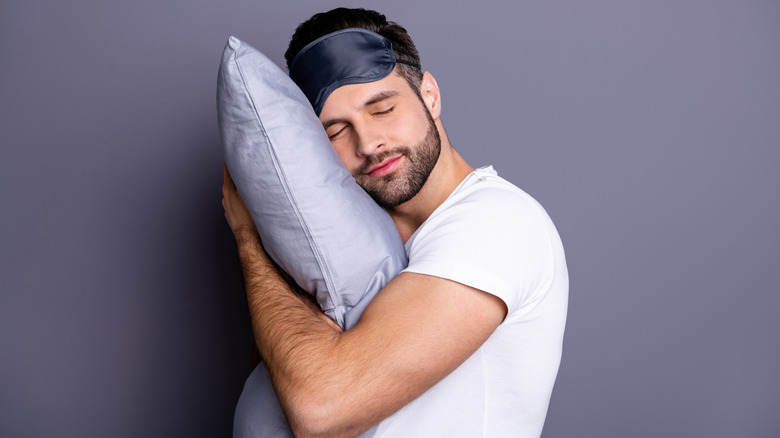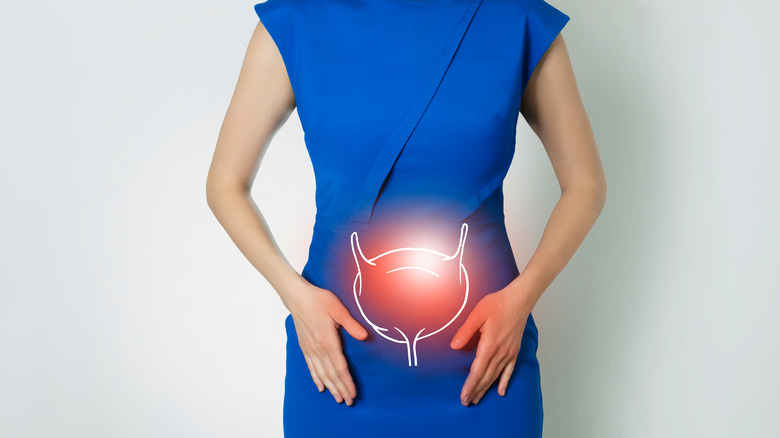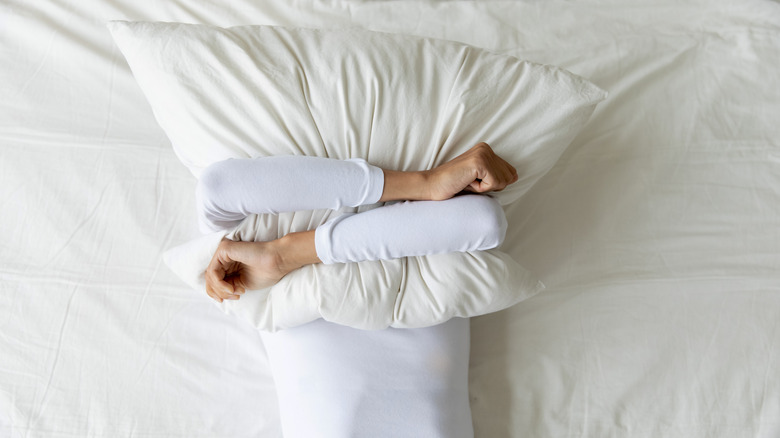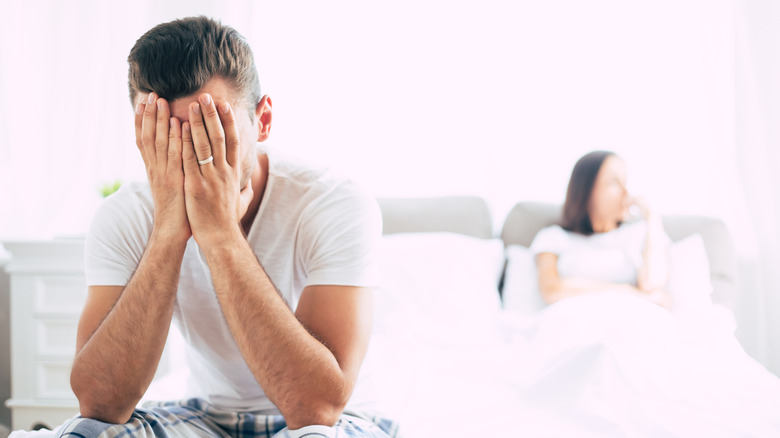Here's The Best Time Of Day To Take Antidepressants
Medicine specifically formulated to treat depression is referred to as antidepressants. These drugs, which must be prescribed by a doctor, are designed to balance our brain's naturally occurring chemicals (via MedlinePlus).
According to the FDA, there are several classes of antidepressants, including selective serotonin reuptake inhibitors (SSRIs), serotonin and norepinephrine reuptake inhibitors (SNRIs), tricyclic and tetracyclic antidepressants, atypical antidepressants, monoamine oxidase inhibitors (MAOIs), N-methyl D-aspartate (NMDA) antagonist, and neuroactive steroid gamma-aminobutyric acid (GABA)-A receptor positive modulator.
Due to the complexity of antidepressants, you may have to experiment with a handful of types to figure out which provides the best relief for you. It's not uncommon to experience mild side effects when introducing antidepressants to your system. Common side effects include nausea, drowsiness, urinary problems, insomnia, and sexual problems. Whenever you experience any side effects for longer than a couple of weeks, it's imperative to communicate with your doctor, so they are aware (via MedlinePlus).
The FDA recommends staying on your medication unless your doctor says otherwise. However, you may put yourself at risk if you quit cold turkey, due to the associated side effects. The side effects will also dictate what time of day you should take your antidepressants.
Nausea
Nausea is a common side effect of antidepressant medications, according to a 2016 review, and is often ranked as the most common side effect related to SSRIs. In addition, it can take some time to get used to a new medication. A 2015 study showed a little over 30% had some nausea. However, some people can experience nausea so harsh or so perpetual they have to stop treatment and find another medication to better suit them. Although nausea occurs more frequently and is more severe with SSRI drugs, it still happens with other types of antidepressants like SNDRIs, SNRIs, and TCAs. Typically, those taking MAOIs don't undergo nausea.
SSRI drugs arouse serotonin which enhances its impact on mood, cognition, and appetite. This rise in serotonin levels stimulates serotonin receptors throughout the body. Specifically, SSRIs revive receptors in the GI tract and the brain, resulting in side effects such as nausea, vomiting, diarrhea, and loss of appetite (via a 2015 review).
As a result, you should take your dose before bed. Talk to your doctor if nausea doesn't go away in a few months or is severe. You might need a lower dose or a different medication.
Drowsiness
Drowsiness is a well-known side effect of taking antidepressants. Antidepressants directly impact neurotransmitters. Specifically, the antidepressants cause the norepinephrine and serotonin neurotransmitters to move between nerve cells to effectively regulate mood. On the other hand, engaging with neurotransmitters like histamine and acetylcholine can cause sedation. The feeling of sedation makes it hard to remain energized throughout the day. Fortunately, there are a few ways to deal with drowsiness caused by your medication (via Verywell Mind).
Lastly, taking your pill before bed may help you fall asleep and stay asleep. Since taking the medication in the morning or afternoon can cause you to feel tired throughout the day, allowing your pill to work throughout the night will leave you more alert once you wake. Avoid operating heavy machinery or driving after you take your antidepressant. Have someone else drive if you need to go somewhere. Taking your dose before bed can help because you're usually in for the night.
Urinary problems
Antidepressants can cause urinary incontinence or worsen your existing bladder control issues, especially SSRIs, which can prevent the bladder from fully functioning, as it can stop it from contracting entirely. Consequently, the bladder doesn't empty, which can lead to heightened urgency or frequency. Without the bladder contracting as it should, those taking antidepressants may not be aware that they need to use the bathroom. Furthermore, antidepressants can cause constipation. When you are constipated, your bowels take up more space in the pelvic area. By doing so, the space the bladder needs to expand isn't available. Doctors identify this issue as indirect bladder incontinence (via Cleveland Clinic).
Urinary problems concerning antidepressants typically occur with children, teenagers, the elderly, and sertraline users. For instance, Zoloft is often associated with frequent urination and urinary incontinence. If you or someone you care for has this side effect, it's better to take the antidepressant in the morning to avoid bedwetting.
Some have reported incontinence issues even after treatment with antidepressants has stopped. To mitigate future urinary problems, contact your doctor to discuss these side effects. You might need a different dose or medication.
Insomnia
Insomnia is a prevalent symptom of depression. Unfortunately, insomnia is also a side effect of antidepressants. Some classes of antidepressants have an energizing impact on those who take them. While this boost of energy is more likely to occur at the start of treatment, some people experience this uptick for the duration of their treatment. In addition to having trouble sleeping, antidepressants can exacerbate existing sleep disorders like sleep apnea, restless legs syndrome, sleep bruxism, nightmares, and REM sleep behavior disorder (via a 2017 study).
To avoid sleep-related issues, antidepressants that keep you wired after taking them should be taken in the morning. The manufacturers of Prozac, for example, suggest taking their medicine in the morning. Doctors also recommend taking certain drugs like Paxil and Wellbutrin in the morning to ward off insomnia in the evening.
Sexual problems
Depression and antidepressants have been linked to lower libido, vaginal dryness, erectile dysfunction, and difficulty having an orgasm. Researchers discovered 50% to 70% of people who are depressed are at risk of suffering from sexual dysfunction. The percentages increased for those taking antidepressants. Sexual-related side effects have shown to be more common with SSRIs, so you may want to try taking a different class of antidepressants (via American Family Physician).
One of the best methods of curbing sexual dysfunction while taking antidepressants is to engage in sexual activity before taking your medication. By having sex before taking your pill, the amount of drugs in your system will be at their lowest point during intimacy. Sometimes people won't know when or if they'll have sex on a particular day. As such, those on antidepressants should try their best to plan ahead. If you're probably going to have sex at night, you should take your pill earlier in the day. If you're likely to have sex in the morning when you wake up, it may be better to take your medication later in the day.

